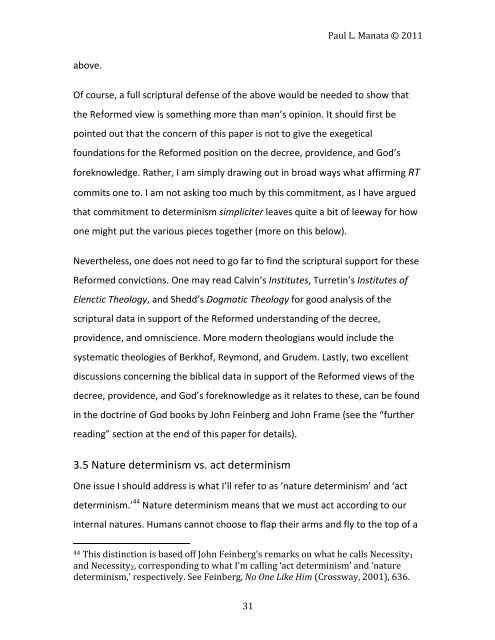Free Will, Moral Responsibility, and Reformed Theology - Analytic ...
Free Will, Moral Responsibility, and Reformed Theology - Analytic ...
Free Will, Moral Responsibility, and Reformed Theology - Analytic ...
You also want an ePaper? Increase the reach of your titles
YUMPU automatically turns print PDFs into web optimized ePapers that Google loves.
above.<br />
31<br />
Paul L. Manata © 2011<br />
Of course, a full scriptural defense of the above would be needed to show that<br />
the <strong>Reformed</strong> view is something more than man’s opinion. It should first be<br />
pointed out that the concern of this paper is not to give the exegetical<br />
foundations for the <strong>Reformed</strong> position on the decree, providence, <strong>and</strong> God’s<br />
foreknowledge. Rather, I am simply drawing out in broad ways what affirming RT<br />
commits one to. I am not asking too much by this commitment, as I have argued<br />
that commitment to determinism simpliciter leaves quite a bit of leeway for how<br />
one might put the various pieces together (more on this below).<br />
Nevertheless, one does not need to go far to find the scriptural support for these<br />
<strong>Reformed</strong> convictions. One may read Calvin’s Institutes, Turretin’s Institutes of<br />
Elenctic <strong>Theology</strong>, <strong>and</strong> Shedd’s Dogmatic <strong>Theology</strong> for good analysis of the<br />
scriptural data in support of the <strong>Reformed</strong> underst<strong>and</strong>ing of the decree,<br />
providence, <strong>and</strong> omniscience. More modern theologians would include the<br />
systematic theologies of Berkhof, Reymond, <strong>and</strong> Grudem. Lastly, two excellent<br />
discussions concerning the biblical data in support of the <strong>Reformed</strong> views of the<br />
decree, providence, <strong>and</strong> God’s foreknowledge as it relates to these, can be found<br />
in the doctrine of God books by John Feinberg <strong>and</strong> John Frame (see the “further<br />
reading” section at the end of this paper for details).<br />
3.5 Nature determinism vs. act determinism<br />
One issue I should address is what I’ll refer to as ‘nature determinism’ <strong>and</strong> ‘act<br />
determinism.’ 44 Nature determinism means that we must act according to our<br />
internal natures. Humans cannot choose to flap their arms <strong>and</strong> fly to the top of a<br />
44 This distinction is based off John Feinberg’s remarks on what he calls Necessity1<br />
<strong>and</strong> Necessity2, corresponding to what I’m calling ‘act determinism’ <strong>and</strong> ‘nature<br />
determinism,’ respectively. See Feinberg, No One Like Him (Crossway, 2001), 636.


